God, as known to us in Jesus Christ, welcomes all.
We welcome people of any race, national origin, ethnicity, gender, sexual orientation, age, social or economic status, employment status, or life situation; including people with physical or mental illness or disability.
We practice loving acceptance of each person and respectful discussion
 of our differences.
of our differences.
Affiliated to Reconciling Ministries Network
Recent News
Sunday Worship Service - July 30 at 10:00 am
July 30, 2023 - 9:51am
Sunday Worship Service - July 23 at 10:00 am
July 23, 2023 - 9:48am
Sunday Worship Service - July 16 at 10:00 am
July 16, 2023 - 10:17am
Vacation Bible School
July 14, 2023 - 10:10pm
Sunday Worship Service - July 9 at 10:00 am
July 9, 2023 - 9:53am
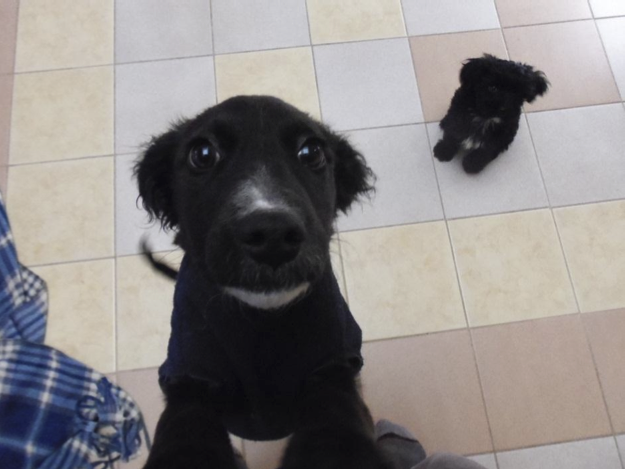 Suma, the dog we rescued from the street early on New Year's Day, has a new sister, "Wawita!" The name is Aymara for "Baby." Suma's a whole lot bigger than when we found her. And mercifully, she ditched puppyhood when we bought Wawita. The little one was frisking around outside a hostel we walk by on our way to and from the market. We asked if she was for sale and learned that, yes, we could buy her for 40 Bolivianos.
Suma, the dog we rescued from the street early on New Year's Day, has a new sister, "Wawita!" The name is Aymara for "Baby." Suma's a whole lot bigger than when we found her. And mercifully, she ditched puppyhood when we bought Wawita. The little one was frisking around outside a hostel we walk by on our way to and from the market. We asked if she was for sale and learned that, yes, we could buy her for 40 Bolivianos.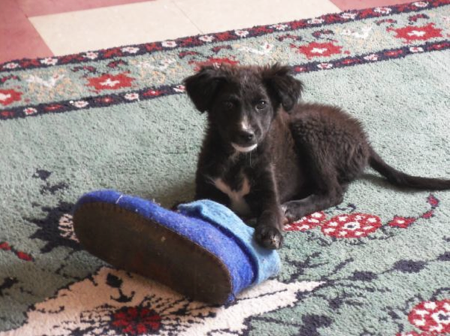 At last: We have a puppy! We found her shivering in the street at 12:45 a.m., New Years Day. So we named her Suma, which is Aymara for “Happy,” as in Happy New Year. She likes a dry house, a warm lap, puppy chow, and ... chewing everything!
At last: We have a puppy! We found her shivering in the street at 12:45 a.m., New Years Day. So we named her Suma, which is Aymara for “Happy,” as in Happy New Year. She likes a dry house, a warm lap, puppy chow, and ... chewing everything!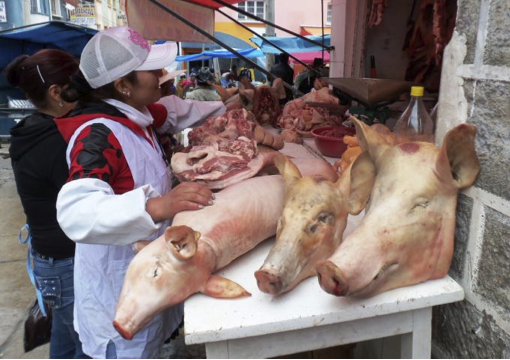 That's Aymara for Happy New Year! Today, New Year's Eve, the streets in Copacabana are chock full of people buying and selling in anticipation of a whole lot of celebrating. One of our favorite meat vendors, Marta, told us "Here everyone eats pork (cerdo) on New Year's Eve." Indeed, every butcher shop is displaying still-hairy pig heads and whole, split-bellied pigs piled five or six deep. So guess what we are having tonight...
That's Aymara for Happy New Year! Today, New Year's Eve, the streets in Copacabana are chock full of people buying and selling in anticipation of a whole lot of celebrating. One of our favorite meat vendors, Marta, told us "Here everyone eats pork (cerdo) on New Year's Eve." Indeed, every butcher shop is displaying still-hairy pig heads and whole, split-bellied pigs piled five or six deep. So guess what we are having tonight...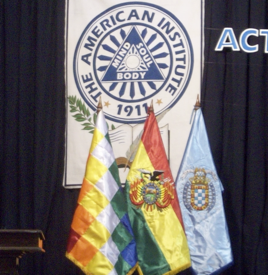
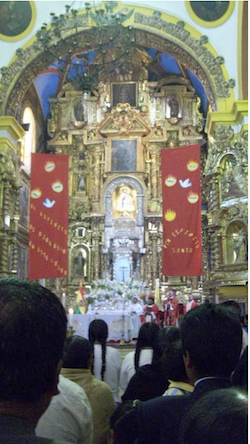 Bless the local vendors, who are patient with our rough Spanish. We teach them a little English. They love teaching us Aymara, the local indigenous language. We all laugh.
Bless the local vendors, who are patient with our rough Spanish. We teach them a little English. They love teaching us Aymara, the local indigenous language. We all laugh. I couldn’t help thinking of the nursery rhyme, “Bah, bah, black sheep,” as we shopped last week for sheep, alpaca and llama fleeces. Instead of three bags full, we bought nine whole alpaca fleeces and two complete sheep skins – for a total of about $40 USD.
I couldn’t help thinking of the nursery rhyme, “Bah, bah, black sheep,” as we shopped last week for sheep, alpaca and llama fleeces. Instead of three bags full, we bought nine whole alpaca fleeces and two complete sheep skins – for a total of about $40 USD. Titicaca region of western Bolivia and southern Peru: ¡Kamasaki! Aymara, the local indigenous language, for hello, how are you.
Titicaca region of western Bolivia and southern Peru: ¡Kamasaki! Aymara, the local indigenous language, for hello, how are you.





